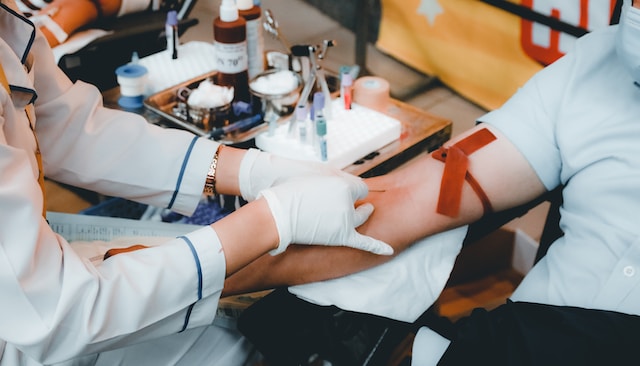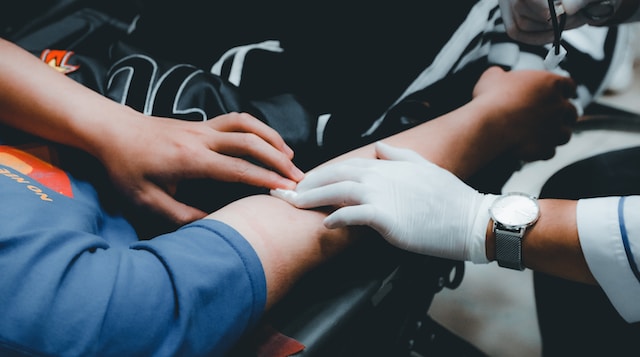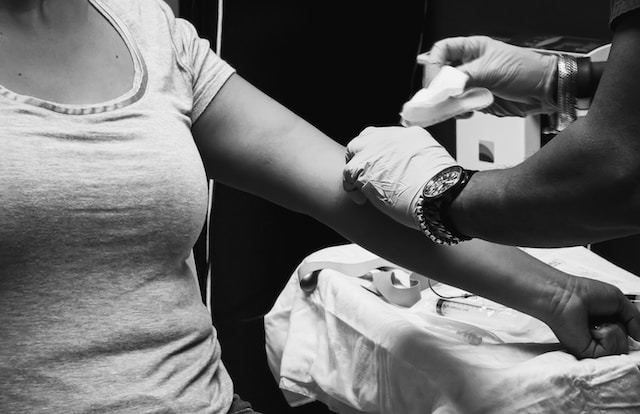We all require blood, especially if we are undergoing significant surgery, or suffering from a condition like anemia, other blood disorders, or certain cancers.
Although some are more uncommon than others, there are eight main blood types. If someone needs emergency surgery and the team is unsure of their blood type, blood type O negative can be used on everyone.
O negative donors are hence frequently referred to as “universal donors.” O negative donors only account for 9% of the UK population, so it’s crucial to get blood from the other blood types as well.
It’s easy to donate blood in London, and it saves lives. Blood is taken from you when you donate it so that someone else can be treated.
In this guide, we have covered how you can donate blood in London.
Contents
- 1 What Does Giving Blood Involve?
- 2 How Long Does It Take To Give Blood?
- 3 Where Can I Give Blood Near Me?
- 4 Can I Give Blood If I’m A Heart Patient?
- 5 Can I Give Blood If I Have High Or Low Blood Pressure?
- 6 Are Diabetics Able To Donate Blood In London?
- 7 How Frequently Can You Donate Blood In London And How Old Must You Be?
What Does Giving Blood Involve?
Around the UK, there are tens of thousands of donation locations, both permanent locations and temporary centers set up for particular days.
- Create an account and an appointment:
You schedule an appointment or go to a drop-in session after registering online to donate blood.
- Before leaving:
Before giving blood, ensure that you are feeling well and that your blood sugar levels are stable by getting a good night’s sleep and eating something.
- When you get there:
You’ll be asked to read a welcome pamphlet about blood donation and blood safety when you get there.
Typically, you will be given 500 ml (a little less than a pint) of water to drink soon before giving blood. This helps to ensure that giving blood won’t have any negative consequences on you.
- Health examination:
In order to ensure that the patients receiving your blood are safe, some questions will be asked of you.
To check your blood’s iron levels, a drop of blood will be drawn from your finger. If you are able to contribute, you will wait in a waiting area until a chair for donations becomes available.
- Blood donation:
Once you’ve been made comfortable in the chair, a cuff will be applied to your arm to apply a slight pressure while you donate. The blood will then gather in a blood bag when the nurse injects a needle into your arm.
Major muscles, including those in your buttocks, can be tightened and relaxed to help keep your blood pressure from lowering and lower your risk of fainting or feeling lightheaded.
- Your blood is weighed by scales:
The process will end once you have contributed 470ml (about one pint) of blood.
- Dressing applied:
A sterile dressing will then be put on your arm after the needle has been taken out.
- Take a break:
It’s recommended that you leave the pressure dressing on your arm for around 30 minutes. Spend this time relaxing in the spa’s spa section. They’ll encourage you to have food and a drink before you go.
How Long Does It Take To Give Blood?
Although this can change, give yourself about an hour and a half for your appointment. The time it takes to actually give blood is only 8 to 10 minutes, but this might vary depending on your medical history.

You should also allow time for the screening before giving blood and at least 15 minutes to unwind while enjoying a drink and food (which will be given) afterward.
Where Can I Give Blood Near Me?
You can donate to the NHS Cord Blood Bank at three hospitals where they have dedicated, expertly trained staff.
They have deliberately targeted their resources so that they collect from hospitals with the widest ethnic mix.
In addition, these hospitals are subject to high delivery rates, which gives them the greatest variety of tissue types for patients. These tissue types are inherited and vary across different ethnic groups.
1. University College Hospital
Address: Euston Road, London NW1 2BU
2. Luton and Dunstable Hospital
Address: Lewsey Road, Luton LU1 ODZ
3. St George’s Hospital
Address: Blackshaw Rd, London SW17 0QT
To check more locations for the NHS Cord Blood Bank, visit this website: https://www.blood.co.uk/the-donation-process/about-our-donation-venues/
Can I Give Blood If I’m A Heart Patient?
It varies. Sadly, you cannot donate blood if you have had a heart attack or stroke, have heart failure, or take heart medications such as anti-clotting ones.
You cannot donate blood if you have undergone heart bypass surgery or other heart surgery for a heart defect that you did not inherit.
You should get in touch with your local blood service if you have undergone surgery for a congenital heart defect (a heart defect that was present at birth).
If you require medication to treat an irregular heartbeat, including heart palpitations, you must not donate. Additionally, you must refrain from donating if you have any symptoms like fainting, breathlessness, weakness, or acute exhaustion.
Can I Give Blood If I Have High Or Low Blood Pressure?
If your blood pressure is high or low, you can still donate blood. Before your session begins, let the staff know about any medications you are taking.

However, you won’t be able to donate blood if you have low blood pressure and feel lightheaded or faint.
If you adhere to the following requirements, you can give even if you have high blood pressure:
- Either the treatment has not yet begun, or you have been taking the same dose of the same drug for four weeks or more and are feeling OK.
- You have never experienced cardiac failure.
- You haven’t undergone blood vascular surgery or an amputation.
- You’ve never experienced gangrene.
- You haven’t had any issues with dizziness, feeling faint, or fainting.
- You are not getting tested for renal disease or receiving treatment for it.
Are Diabetics Able To Donate Blood In London?
If you don’t need therapy or have been using non-insulin diabetic medicine for four weeks or more and have type 2 diabetes, you can typically donate. When you go to give blood, it’s crucial to let the staff know about any medications you are taking.

If you need insulin for your diabetes or have issues with your diabetes, you typically cannot give blood.
How Frequently Can You Donate Blood In London And How Old Must You Be?
In London, men are permitted to donate blood every 12 weeks. Every 16 weeks, women can donate blood.
To donate blood, you must be between the ages of 17 and 66, or 70 if you have previously donated blood.

